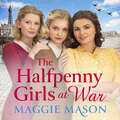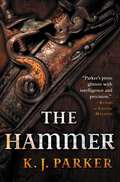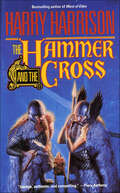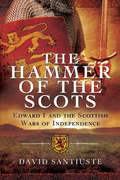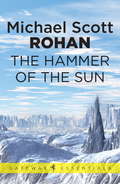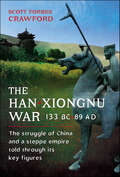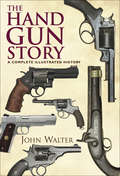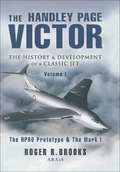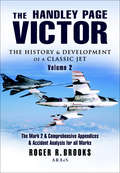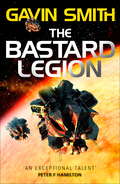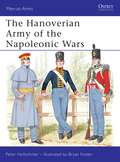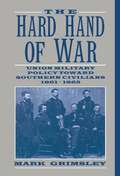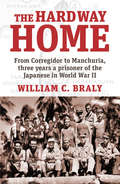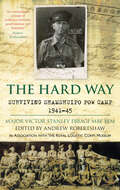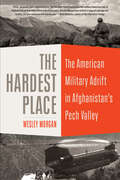- Table View
- List View
The Halfpenny Girls at Christmas: A heart-warming and nostalgic festive family saga - the perfect winter read!
by Maggie MasonTHE SECOND NOVEL IN THE BRAND NEW SAGA SERIES BY MAGGIE MASON - MEET THE HALFPENNY GIRLS. . . 'In the grand tradition of sagas set down by the late and great Catherine Cookson ' Jean Fullerton on Blackpool LassWill their prayers be answered at the most wonderful time of the year?/font>As Christmas approaches, Alice, Edith and Marg continue to face hardships growing up on one of the poorest streets in Blackpool. Penniless, their friendship has helped them survive this far, but it'll take more than that to see them through the dark days that lie ahead . . .Newly married Alice receives shocking news about her pregnancy that threatens the future she's always dreamed of, Marg is struggling to care for her ailing mother and ensure her little sister receives the education she deserves, and Edith is grieving the loss of her family while preparing to marry her sweetheart. The Halfpenny Girls once again are faced with a struggle, but with the festive season upon them will family, friendship and Christmas spirit see them through?The second in a brand new series from reader favourite Maggie Mason, The Halfpenny Girls is the perfect heart-warming family saga about overcoming hardship and the value of friendship. Perfect for fans of Val Wood, Kitty Neale and Rosie Goodwin.Readers LOVE Maggie Mason's Blackpool sagas:'5 stars - I wish I could give it more. Wonderful read.''Another must read book''What a brilliant book. I couldn't put it down!''I was hooked from the first page . . . this author is a must read''A totally absorbing read'
The Halfpenny Girls at Christmas: A heart-warming and nostalgic festive family saga - the perfect winter read!
by Maggie MasonTHE SECOND NOVEL IN THE BRAND NEW SAGA SERIES BY MAGGIE MASON - MEET THE HALFPENNY GIRLS. . . 'In the grand tradition of sagas set down by the late and great Catherine Cookson ' Jean Fullerton on Blackpool LassWill their prayers be answered at the most wonderful time of the year?/font>As Christmas approaches, Alice, Edith and Marg continue to face hardships growing up on one of the poorest streets in Blackpool. Penniless, their friendship has helped them survive this far, but it'll take more than that to see them through the dark days that lie ahead . . .Newly married Alice receives shocking news about her pregnancy that threatens the future she's always dreamed of, Marg is struggling to care for her ailing mother and ensure her little sister receives the education she deserves, and Edith is grieving the loss of her family while preparing to marry her sweetheart. The Halfpenny Girls once again are faced with a struggle, but with the festive season upon them will family, friendship and Christmas spirit see them through?The second in a brand new series from reader favourite Maggie Mason, The Halfpenny Girls is the perfect heart-warming family saga about overcoming hardship and the value of friendship. Perfect for fans of Val Wood, Kitty Neale and Rosie Goodwin.Readers LOVE Maggie Mason's Blackpool sagas:'5 stars - I wish I could give it more. Wonderful read.''Another must read book''What a brilliant book. I couldn't put it down!''I was hooked from the first page . . . this author is a must read''A totally absorbing read'
The Halfpenny Girls at War: the BRAND NEW heart-warming and nostalgic family saga
by Maggie MasonTHE THIRD NOVEL IN THE BRAND NEW SAGA SERIES BY MAGGIE MASON - MEET THE HALFPENNY GIRLS. . . 'In the grand tradition of sagas set down by the late and great Catherine Cookson ' Jean Fullerton on Blackpool LassWill friendship see them through the struggles of war?As war approaches, Alice, Edith and Marg fear for the safety of their families, while trying to decide the best way they can do their bit for their country.Alice decides to volunteer with the Red Cross, helping those most in need, Marg is preparing to marry her true love at the most dangerous of times, and Edith hopes to finally realise her dream of becoming a teacher, and starting a family of her own.Things have never been easy for The Halfpenny Girls, but family, friendship and community spirit will always see them through the darkest of days. . . The third in a brand new series from reader favourite Maggie Mason, The Halfpenny Girls at War is the perfect heart-warming family saga about overcoming hardship and the value of friendship. Perfect for fans of Val Wood, Kitty Neale and Rosie Goodwin'In the grand tradition of sagas set down by the late and great Catherine Cookson' Jean Fullerton on Blackpool LassReaders LOVE Maggie Mason's Blackpool sagas:'5 stars - I wish I could give it more. Wonderful read.''Another must read book''What a brilliant book. I couldn't put it down!''I was hooked from the first page . . . this author is a must read''A totally absorbing read'
The Halfpenny Girls at War: the BRAND NEW heart-warming and nostalgic family saga
by Maggie MasonTHE THIRD NOVEL IN THE BRAND NEW SAGA SERIES BY MAGGIE MASON - MEET THE HALFPENNY GIRLS. . . 'In the grand tradition of sagas set down by the late and great Catherine Cookson ' Jean Fullerton on Blackpool LassWill friendship see them through the struggles of war?As war approaches, Alice, Edith and Marg fear for the safety of their families, while trying to decide the best way they can do their bit for their country.Alice decides to volunteer with the Red Cross, helping those most in need, Marg is preparing to marry her true love at the most dangerous of times, and Edith hopes to finally realise her dream of becoming a teacher, and starting a family of her own.Things have never been easy for The Halfpenny Girls, but family, friendship and community spirit will always see them through the darkest of days. . . The third in a brand new series from reader favourite Maggie Mason, The Halfpenny Girls at War is the perfect heart-warming family saga about overcoming hardship and the value of friendship. Perfect for fans of Val Wood, Kitty Neale and Rosie Goodwin'In the grand tradition of sagas set down by the late and great Catherine Cookson' Jean Fullerton on Blackpool LassReaders LOVE Maggie Mason's Blackpool sagas:'5 stars - I wish I could give it more. Wonderful read.''Another must read book''What a brilliant book. I couldn't put it down!''I was hooked from the first page . . . this author is a must read''A totally absorbing read'
The Halfpenny Girls at War: the BRAND NEW heart-warming and nostalgic family saga
by Maggie MasonTHE THIRD NOVEL IN THE BRAND NEW SAGA SERIES BY MAGGIE MASON - MEET THE HALFPENNY GIRLS. . . 'In the grand tradition of sagas set down by the late and great Catherine Cookson ' Jean Fullerton on Blackpool LassWill friendship see them through the struggles of war?As war approaches, Alice, Edith and Marg fear for the safety of their families, while trying to decide the best way they can do their bit for their country.Alice decides to volunteer with the Red Cross, helping those most in need, Marg is preparing to marry her true love at the most dangerous of times, and Edith hopes to finally realise her dream of becoming a teacher, and starting a family of her own.Things have never been easy for The Halfpenny Girls, but family, friendship and community spirit will always see them through the darkest of days. . . The third in a brand new series from reader favourite Maggie Mason, The Halfpenny Girls at War is the perfect heart-warming family saga about overcoming hardship and the value of friendship. Perfect for fans of Val Wood, Kitty Neale and Rosie Goodwin'In the grand tradition of sagas set down by the late and great Catherine Cookson' Jean Fullerton on Blackpool LassReaders LOVE Maggie Mason's Blackpool sagas:'5 stars - I wish I could give it more. Wonderful read.''Another must read book''What a brilliant book. I couldn't put it down!''I was hooked from the first page . . . this author is a must read''A totally absorbing read'
The Hammer
by K. J. ParkerGignomai is the youngest brother in the current generation of met'Oc, a once-noble family exiled on an island for their role in a vaguely remembered civil war. On this island, a colony was founded seventy years ago. The plan was originally for the colonists to mine silver, but there turned out not to be any. Now, an uneasy peace exists on the island, between the colonists and the met'Oc. The met'Oc are tolerated, in spite of occasional cattle stealing raids, since they alone possess the weapons considered necessary protection against the island's savages. Gignomai is about to discover exactly what it is expected of him, and what it means to defy his family. He is the hammer who will provide the spark that will ignite a brutal and bloody war.
The Hammer and the Cross (The Hammer and the Cross #1)
by Harry HarrisonIn this rich and exciting alternate history, a Science Fiction Hall of Famer “evokes the spirit and atmosphere of the so-called Dark Ages” (Publishers Weekly).865 A.D. Warring kings rule over the British Isles, but the Church rules over the kings, threatening all who oppose them with damnation. Only the dreaded Vikings of Scandinavia do not fear the priests.Shef, the bastard son of a Norse raider and a captive English lady, is torn by divided loyalties and driven by strange visions that seem to come from Odin himself. A blacksmith and warrior, he alone dares to imagine new weapons and tactics with which to carve out a kingdom—and launch an all-out war between. . . . The Hammer and the Cross.“Savage, inventive, compelling.” —Piers Anthony, New York Times–bestselling author of the Xanth series“Few historicals are as powerfully evocative of time and place as Harrison’s tremendous saga.” —Kirkus Reviews
The Hammer of the Scots: Edward I and the Scottish Wars of Independence
by David SantiusteKnown to posterity as Scottorum Malleus - the Hammer of the Scots - Edward I was one of medieval England's most formidable rulers. In this meticulously researched new history, David Santiuste offers a fresh interpretation of Edward's military career, with a particular focus on his Scottish wars. This is in part a study of personality: Edward was a remarkable man. His struggles with tenacious opponents - including Robert the Bruce and William Wallace - have become the stuff of legend.There is a clear and perceptive account of important military events, notably the Battle of Falkirk, but the narrative also encompasses the wider impact of Edward's campaigns. He attempted to mobilize resources - including men, money and supplies - on an unprecedented scale. His wars affected people at all levels of society, throughout the British Isles.David Santiuste builds up a vivid and convincing description of Edward's campaigns in Scotland, whilst also exploring the political background. Edward emerges as a man of great conviction, who sought to bend Scotland to his will, yet also, on occasion, as a surprisingly beleaguered figure. He is presented here as the central character in a turbulent world, as commander and king.
The Hammer of the Sun (Gateway Essentials #312)
by Michael Scott RohanIn the great battle which had returned control of Morvannec, the legendary city, to mankind, Elof the Smith had saved Kara, his love, from the immortal Power which ruled her. But in the seven years since, the Smith has grown fearful that Kara, herself no mortal, will one day leave him. In his fear, Elof makes the mistake of drawing on his own uncanny powers to bind Kara closer to him; he only succeeds in driving her away. Haunted, guilt-ridden, Elof can do nothing but follow his love eastwards, across the Seas of Sunrise, towards the city of Kerys in which Kermorvan of Kerbryhaine's people had originated. In the myth-filled lands of the East, where the Powers of the Ice contemplate the total extinction of life, Elof must face his past, his future and his destiny.
The Han-Xiongnu War, 133 BC–89 AD: The Struggle of China and a Steppe Empire Told Through Its Key Figures
by Scott CrawfordThrough a series of novelistic biographies that showcase the pivotal roles and actions of those involved, dive into a centuries-long fight for survival for the Han empire that resulted in a golden age for China. The Han-Xiongnu War (133 BC – AD 89) pitted the Han dynasty of China against a confederation of nomadic steppe peoples, the Xiongnu Empire. In campaigns waged on a huge scale by the standards of contemporary Western warfare (perhaps half a million soldiers were fielded at the Battle of Mobei in 119 BC), the two states fought for control of Central Asia, hungry for its rich resources and Western trade links. China’s victory set the stage for millennia of imperial rule and a vast sphere of influence in Asia. Scott Forbes Crawford examines the war in a lively, engaging narrative. He builds a mosaic encompassing the centuries of conflict through biographies of fifteen historical figures: the Chinese and Xiongnu emperors who first led their armies into battle; ‘peace bride’ Princess Jieyou, whose marriage to a steppe king forged a vital Chinese alliance; the explorer-diplomat Zhang Qian, who almost-inadvertently established the Silk Road, among other key individuals. Their stories capture the war’s breadth, the enduring impact on Han society and statecraft in what became a Chinese golden age, and the doomed resistance of the Xiongnu to an ever-strengthening juggernaut.
The Hand Grenade
by Gordon L. RottmanThe Hand Grenade is the dramatic story, covering its origins, development, use - in the World Wars and into the present day - and lasting influence on close-quarter combat and infantry tactics.Allowing the user to inflict damage on his opponent within throwing range without leaving cover, the portable, lethally efficient hand grenade is a ubiquitous weapon of modern warfare, and has now found its way into law-enforcement arsenals too. In this engaging study the origins, development, combat use and lasting legacy of the military hand grenade are explored and assessed, accompanied by specially commissioned full-color artwork and an array of revealing photographs of grenades in use and in close-up.
The Hand Gun Story: A Complete Illustrated History
by John WalterA firearms expert &“traces the history of the &‘one hand gun&’ from its 14th century origins . . . surveying changing technology, techniques, and design&” (Midwest Book Review). Ideally suited for both attack and self-defense, handguns have gotten smaller and deadlier. But the earliest pistols had a tendency to misfire. This was cured by the cap-lock, which proved a massive success in the American Civil War, with hundreds of thousands of cap-lock revolvers used on each side. Self-contained metal-case cartridges were to bring a fundamental change to handgun design: not only by allowing the introduction of revolvers that ejected automatically or were easily reloaded, but also by paving the way for the automatic pistol. World War I provided the handgun with a proving ground. At the end of the hostilities, with so much surplus weaponry, work on the handgun could have ceased; instead, a new developmental phase was begun by the nations that had emerged from the crumbling Imperial empires. During World War II, the efficiency of well-established designs was confirmed and new designs, such as the Walther P. 38, showed their potential. The emergence of the submachine-gun in 1945 reduced the status of the handgun—but only temporarily. The need for efficient self-defense shows no signs of lessening; and the rise in shooting for sport, particularly with the revolver, has sharpened the quest for efficiency. The never ending search for advanced production techniques shows that the handgun has as much a future in the twenty-first century as it had in the heyday of the Wild West, or in the trenches of Passchendaele.
The Handbook of British Regiments (Routledge Revivals)
by Christopher ChantSince the creation of the standing army in 1661, when each regiment was known by the name of its current colonel, there have been many reforms and rationalizations of the British army. From 31 cavalry regiments and 113 infantry regiments in 1881, at the time of this title’s first publication in 1988, the army had reduced to just 16 regiments of armour and 39 regiments of infantry through processes of absorption and amalgamation. The Handbook of British Regiments provides insight into the lineage and history of the approximately 85 regiments and corps which formed the British army towards the end of the 1980s. Comprehensive in coverage, each has a separate entry giving factual details in a layout standardized for easy comparison, including current title, colonel-in-chief, uniform and history, amongst others. A key title amongst Routledge reference reissues, this handbook provides an accessible guide to specialists as well as lay enthusiasts, and illustrates a sense of the continuity and inherited tradition of each regiment and corps.
The Handley Page Victor: The HP80 Prototype & The Mark I
by Roger BrooksThe Handley Page Victor was the longest serving V-Bomber with the RAF. It was conceived in 1945 and after much research and development the Mk 1 entered service in the late 1950s to become part of the UK's nuclear deterrent force. It could fly faster, higher and further than any comparable aircraft of that era. It boasted a unique crescent wing shape and was the most handsome of the three types of V bomber. It was later extensively modified to become the RAF's main tanker aircraft for in-flight refuelling and served in that role from 1965 until 1993. This is the most authoritative reference to the aircraft yet to be published. Commencing with the first design trials and test flights, each chapter includes personnel recollections from pilots and design staff, and is solidly based on official government and company reports, many of which are included. The text explains the introduction and operation once it was in RAF service and explains the various roles that it undertook and the many experiments and trials that took place to perfect the various systems required for these roles. The Mk 2 was a much improved model and many were adapted for tanker duties. All is fully explained with copious diagrams and rarely seen photographs. Lengthy appendices detail Aircraft Accident Reports and other unique information that has never been published.This is the ultimate reference book on this famous and much-loved aircraft.7 Colour Profiles by David Windle, 22 Colour Photographs, 170 Mono Photographs and 66 Diagrams
The Handley Page Victor: The Mark 2 & Comprehensive Appendices & Accident Analysis for all Marks
by Roger BrooksThe first volume of Roger Brooks detailed reference to the Victor covers the conception, design and test-flying of the prototype HP 80 and then the production and operation of the Mark 1 in its many roles. This second volume completes the history of the aircraft by describing the improved Mark 2 that was primarily conceived to carry Britains Blue Steel nuclear deterrent. The aircraft was to be re-engined with the Rolls-Royce Conway and the enlargement of the air intakes in the wing are one of the more noticeable external differences on these models. When the V-Bomber Force lost its primary raison detre as the delivery vehicle for the nuclear deterrent, the Victors were adapted for the air-to-air refueling tanker role, a task they successfully carried out until their airframe life was exhausted.This volume also includes lengthy appendices on all Marks that include a mass of detailed historical information, the testing of many new systems, modifications throughout service life, the authors first-hand experiences as a Victor crew chief, operational records and a complete list of all Victor accidents with a detailed analysis and official reports.
The Hangman and His Wife: The Life and Death of Reinhard Heydrich
by Nancy DoughertyAn astonishing journey into the heart of Nazi evil: a portrait of one of the darkest figures of Hitler&’s Nazi elite—Reinhard Heydrich, the designer and executor of the Holocaust, chief of the Reich Main Security, including the Gestapo—interwoven with commentary by his wife, Lina, from the author's in-depth interviews.He was called the Hangman of the Gestapo, the "butcher of Prague," with a reputation as a ruthlessly efficient killer. He was the head of the SS, and the Gestapo, second in command to Heinrich Himmler. His orders set in motion the Kristallnacht pogrom of 1938 and, as the lead planner of Hitler's Final Solution, he chaired the Wannsee Conference, at which details of the murder of millions of Jews across Nazi-occupied Europe were toasted with cognac. In The Hangman and His Wife, Nancy Dougherty, and, following her death, Christopher Lehmann-Haupt, masterfully explore who Heydrich was and how he came to be, and how he came to do what he did. We see Heydrich from his rarefied musical family origins and his ugly-duckling childhood and adolescence, to his sudden flameout as a promising Naval officer (he was forced to resign his Naval commission after dishonoring the office corps by having sex with the unmarried daughter of a shipyard director and refusing to marry her). Dougherty writes of his seemingly hopeless job prospects as an untrained civilian during Germany&’s hyperinflation and unemployment, and his joining the Nazi party through the attraction to Nazism of his fiancée, Lina von Osten, and her father, along with the rumor shadowing him of a strain of Jewishness inherited from his father&’s side. And we follow Heydrich&’s meteoric rise through the Nazi high command—from SS major, to colonel to brigadier general, before he was thirty, deputy to Heinrich Himmler, expanding the SS, the Gestapo, and developing the Reich's plans for "the Jewish solution." And throughout, we hear the voice of Lina Heydrich, who was by his side until his death at the age of thirty-eight, living inside the Nazi inner circles as she waltzed with Rudolf Hess, feuded with Hermann Göring, and drank vintage wine with Albert Speer.
The Hangman's Daughter: Book 1
by Gavin G. SmithFour hundred years in the future, the most dangerous criminals are kept in suspended animation aboard prison ships and "rehabilitated" in a shared virtual reality environment. But Miska Corbin, a thief and hacker with a background in black ops, has stolen one of these ships, the Hangman's Daughter, and made it her own. Controlled by explosive collars and trained in virtual reality by the electronic ghost of a dead marine sergeant, the thieves, gangsters, murderers, and worse are transformed into Miska's own private indentured army: the Bastard Legion. Are the mercenaries just for fun and profit, or does Miska have a hidden purpose connected to her covert past?
The Hanoverian Army of the Napoleonic Wars
by Peter Hofschroer Bryan FostenOf all the armies of the German States, that of Hanover remains of greatest interest to the British reader due to the close links between the crowns of the two states. Throughout the Napoleonic era Britain and Hanover had the same head of state, George III. Symbolic of their close relationship, the Hanoverian Army wore uniforms and used equipment largely similar to those used by the British Army. Complemented by numerous illustrations and photographs, plus eight full page colour plates, this text explores the uniforms and organization of the army of the Electorate of Hanover and the King's German Legion.
The Hard Hand of War: Union Military Policy Toward Southern Civilians, 1861-1865
by Mark GrimsleyThe book explores the Union army's policy of destructive attacks upon Southern property and civilian morale--how it evolved, what it was like in practice. Through comparisons with earlier European wars and through the testimony of Union soldiers and Southern civilians alike, Grimsley shows that Union soldiers exercised restraint even as they made war against the Confederate civilian population.
The Hard Road Will Take You Home: What the Special Forces Teaches Us About Innovation, Endeavour and Next-Level
by Anthony ‘Staz’ Stazicker'Incredible ... Staz is an inspiration' Nims Purja'A must read for anyone who wants to succeed and thrive under pressure' Dylan Hartley'Stacked with insights ... The book you need when the going gets tough' Aldo KaneElite Discipline meets Creative EffortAnthony 'Staz' Stazicker served an impressive 13 years of distinguished and decorated military service, ten within the Special Forces, before founding the multi-million pound technical clothing company ThruDark. Throughout his career in the Special Forces - featuring gunfights, door-kicking operations, and against-the-odds escapes - he learned hard lessons that would later provide crucial intelligence equally applicable to business, innovation and enterprise. The Hard Road Will Take You Home provides a mission plan that distils the processes and tactics Staz gathered throughout his career and translates them into tools that can be used in any number of settings, and by individuals with a wide range of experience and backgrounds. It instils the psychological cues required to bring next level success to any mission. And it lays bare the levels of discipline required to maintain that next level success. Introducing four concepts that make up the life of an elite operator - battle prep; techniques, tactics and procedures; teamwork and the lessons we should all consider when learning how to innovate, persevere and succeed - this book comes stacked with insight, easily applicable techniques and psychological processes gathered from Staz's time serving with the most resilient fighting force in the world.As a creative resource, it's a weapon.
The Hard Slog
by Karl JamesThis edition features the exact same content as the traditional text in a convenient, three-hole-punched, loose-leaf version. Books a la Carte also offer a great value-this format costs significantly less than a new textbook. Bob Blitzer has inspired thousands of students with his engaging approach to mathematics, making this beloved series the #1 in the market. Blitzer draws on his unique background in mathematics and behavioral science to present the full scope of mathematics with vivid applications in real-life situations. Students stay engaged because Blitzer often uses pop-culture and up-to-date references to connect math to students' lives, showing that their world is profoundly mathematical.
The Hard Way Home
by William C. BralyThe Hard Way Home is a detailed accounting by U.S. Army Colonel William C. Braly of his capture and 3-1/2 year internment by the Japanese during of World War II. Beginning with the surrender of Allied forces in the Philippines on May 4, 1942, The Hard Way Home chronicles Braly’s imprisonment first in Manila, then northward to camps in Luzon, Taiwan, Japan, and Manchuria. The Hard Way Home was prepared from 34 journals kept by Braly during his time as a prisoner, and are held today in the U.S. Army Military History Institute, Carlisle Barracks, Carlisle, Pennsylvania. Includes 10 pages of illustrations.
The Hard Way: Adapt, Survive and Win
by Mark BillinghamBilly Billingham grew up tough; a grim future ahead of him offering little respite from the hostile streets he walked. Leaving school at eleven years of age, the threat of borstal hanging over his head, running with gangs in Birmingham, and almost being killed in a knife fight eventually led to Billy discovering the British armed forces at sixteen years of age. It would be the making of him. Billingham would graduate from the Royal Marine cadets to enlisting with the Parachute Regiment in 1983, where he would serve with distinction as a Patrol Commander and expert sniper. In 1991 he took on an even bigger challenge – taking the SAS course – the fearsome and secretive elite special forces unit with a well-won reputation for excellence in operating in extreme and hazardous conditions. He excelled in this life, rising to the rank of sergeant major for the regiment, and undertaking dozens of classified and extremely dangerous missions. He would ultimately serve seventeen years with the SAS, serving in countless war zones, winning a commendation for bravery and being awarded the MBE. After leaving the army he would embrace the life of a bodyguard to Hollywood stars such as Angelina Jolie, Brad Pitt, Sir Michael Caine, Tom Cruise and Russell Crowe, before being recruited as one of the lead instructors on SAS - Who Dares Wins for television. Billy is a highly-decorated veteran; with a reputation for excellence, honesty and integrity not only supporting his comrades Ant Middleton, Jason Fox and Ollie Ollerton, but equally intimidating and inspiring the contestants who take on the gruelling challenges each week. The Hard Way details Billy&’s story thus far, but will also educate and enthral those wishing to seek a challenge and conquer it – the SAS way.
The Hard Way: Surviving Shamshuipo POW Camp 1941-45
by Andrew Robertshaw Victor Stanley EbbageMajor Vic Ebbage was a Colonel with the Royal Army Ordnance Corps, serving in Hong Kong in 1941, when his garrison was attacked by the Japanese Army. He was captured and taken prisoner to the notorious Hong Kong death camp, Samshuipo, where he was held from 30th December 1941 to August 1945. His story is an extraordinary one of survival against all the odds, but more than that it is a story of how a group of men worked together to improve conditions in the camp for their fellow prisoners. They were offered nothing by their captors, but their constant command of 'improvise', which they learned to do by recycling salvaged materials into everything from homemade nails, cooking pots and plates to surgical instruments, beds and nesting boxes. His diary demonstrates how individuals can work together in almost unimaginable adversity to improve life for their fellow man, and how imagination and innovation can flourish in even the worst conditions. This story is a model of care, humanity and inventiveness.
The Hardest Place: The American Military Adrift in Afghanistan's Pech Valley
by Wesley Morgan&“The definitive account of America&’s heroic but ultimately doomed effort in one of Afghanistan&’s most rugged regions.&”—Sebastian Junger, author of Tribe &“A saga of courage and futility, of valor and error and heartbreak.&”—Rick Atkinson, author of the Liberation TrilogyWhen we think of the war in Afghanistan, chances are we're thinking of a small, remote corner of the country where American military action has been concentrated: the Pech and its tributary valleys in Kunar and Nuristan provinces. The rugged, steep terrain and thick forests made the region a natural hiding spot for targets in the American war on terror, from Osama bin Laden to the Islamic State, and it has been the site of constant U.S. military activity for nearly two decades. Even as the U.S. presence in Afghanistan transitions to a drone war, the Pech has remained at the center of it, a testbed for a new method of remote warfare.Wesley Morgan first visited the Pech in 2010, while he was still a college student embedding with military units as a freelancer. By then, the Pech and its infamous tributary the Korengal had become emblematic of the war, but Morgan found that few of the troops fighting there could explain why their remote outposts had been built. In The Hardest Place, he unravels the history those troops didn&’t know, captures the culture and reality of the war through both American and Afghan eyes, and reports on the snowballing American missteps that made each unit&’s job harder than the last as storied outfits like Marines, paratroopers, Rangers, Green Berets, and SEALs all took their turn.Through reporting trips, hundreds of interviews with Americans and Afghans, and documentary research, Morgan writes vividly of large-scale missions gone awry, years-long hunts for single individuals, and the soldiers, Marines, commandos, and intelligence operatives who cycle through, along with several who return again and again to the same slowly evolving fight.As the war drags on through its fourth presidential administration, Morgan concludes that we've created a status quo that could last forever in the Pech, with the military and intelligence agencies always in search of the next target.


